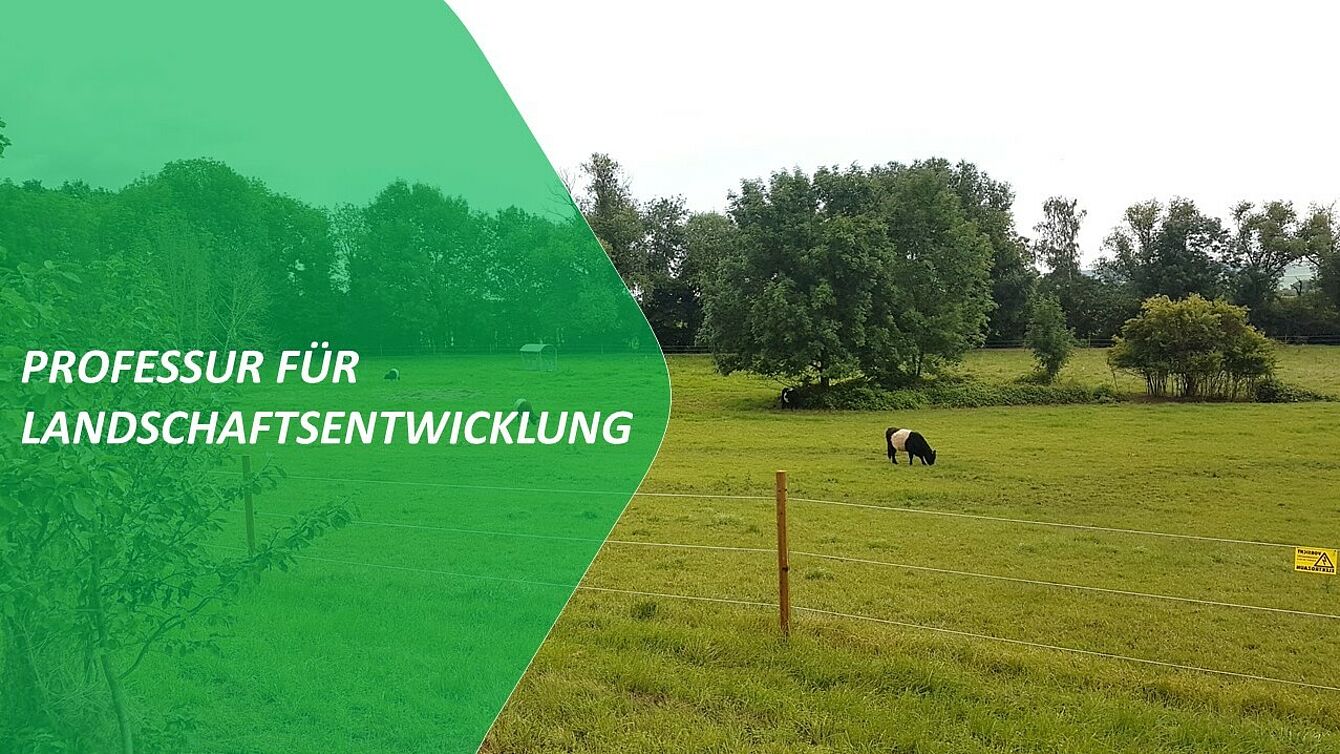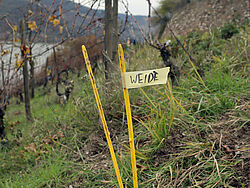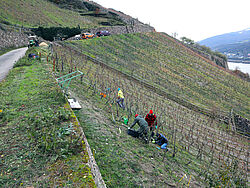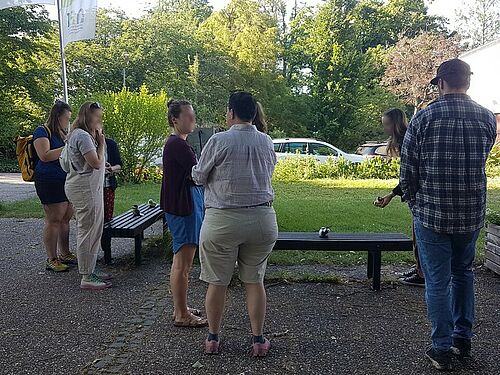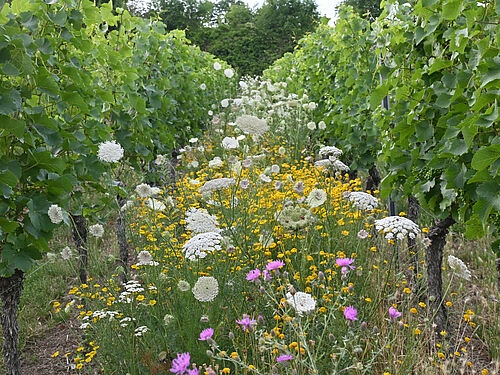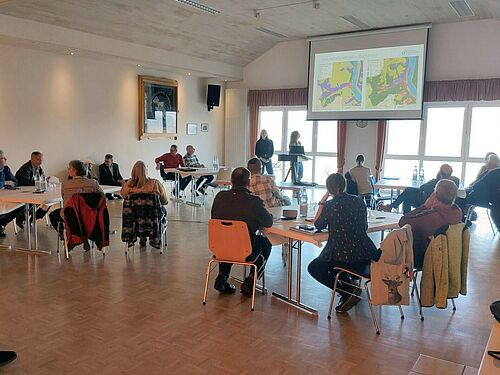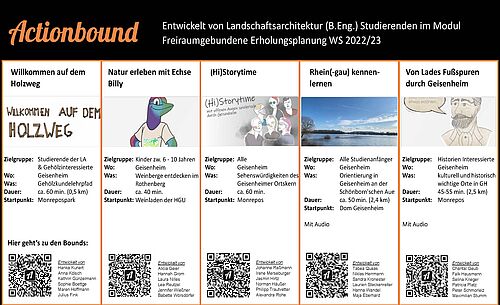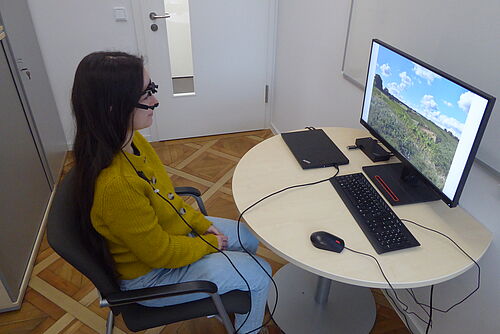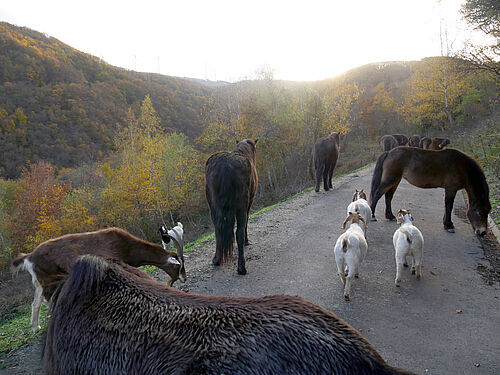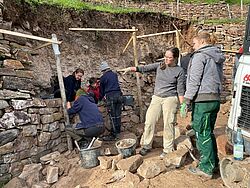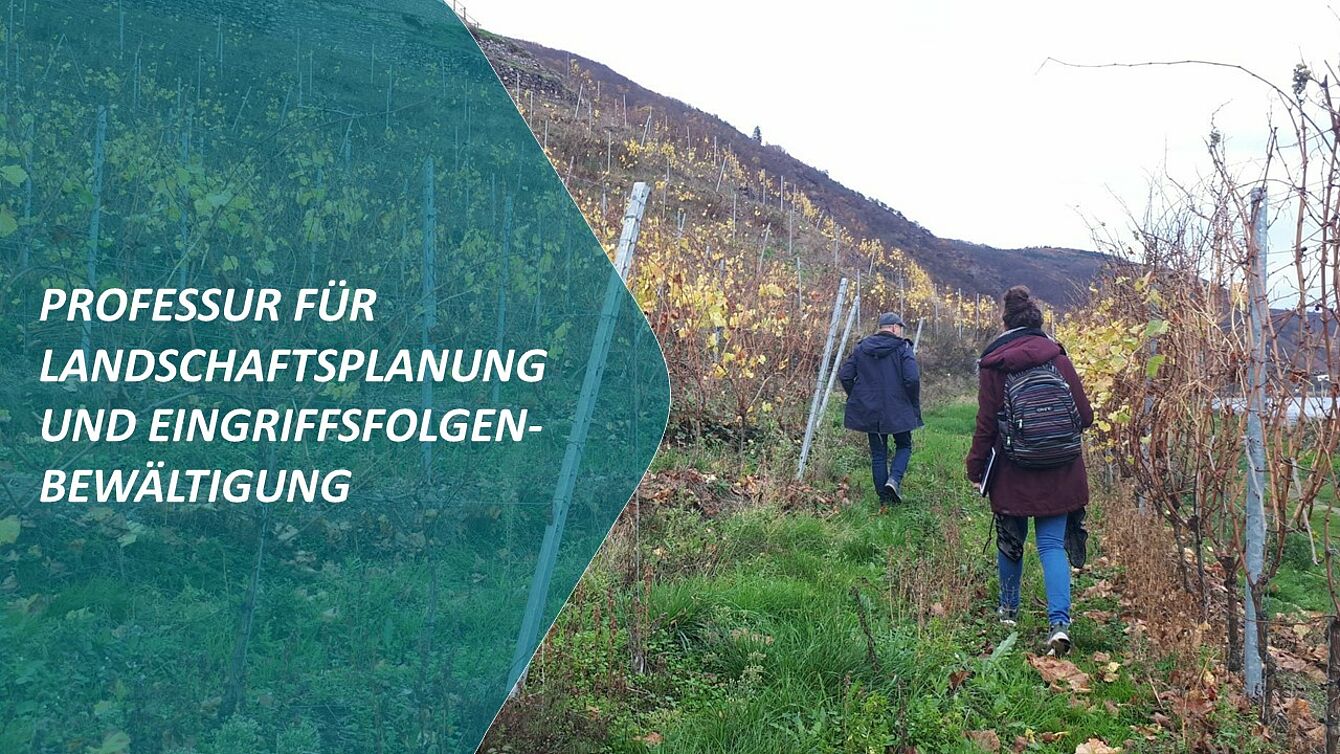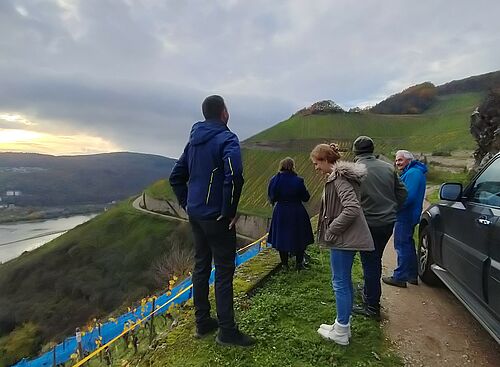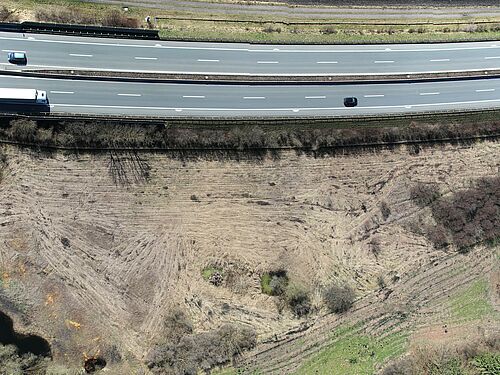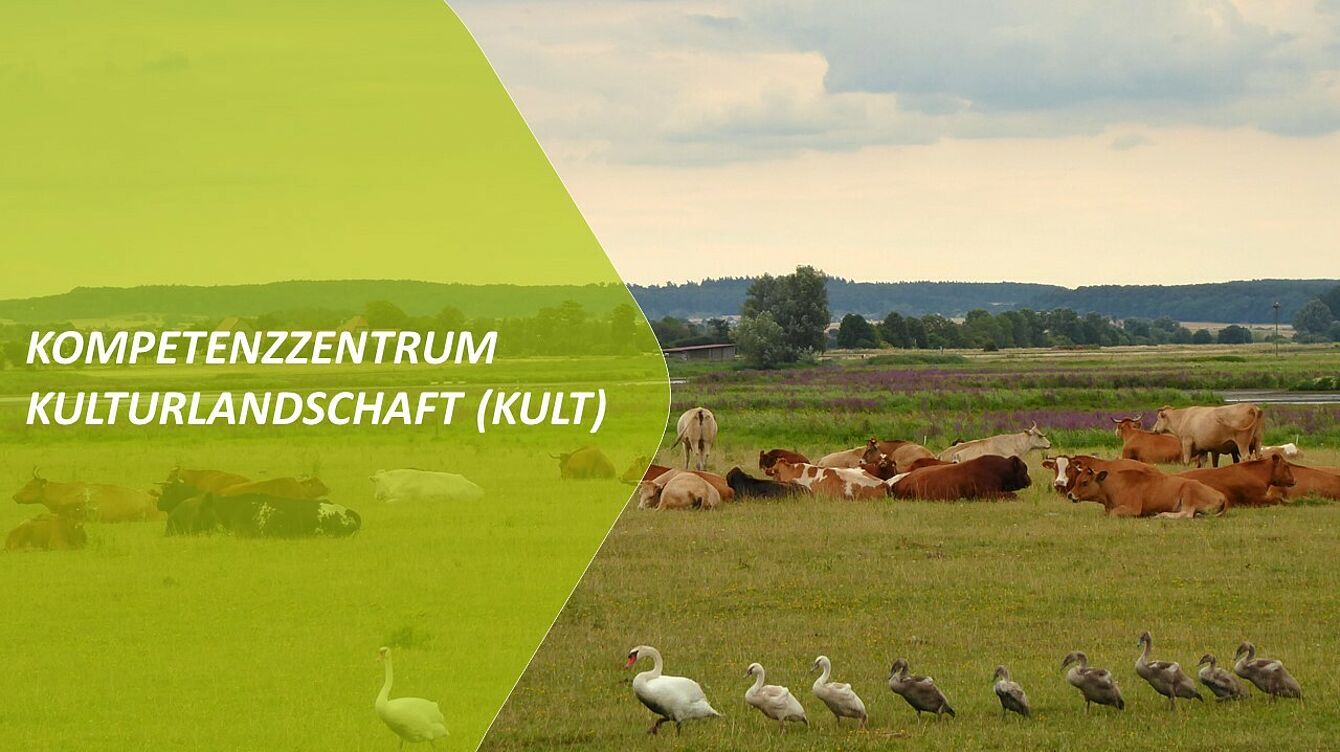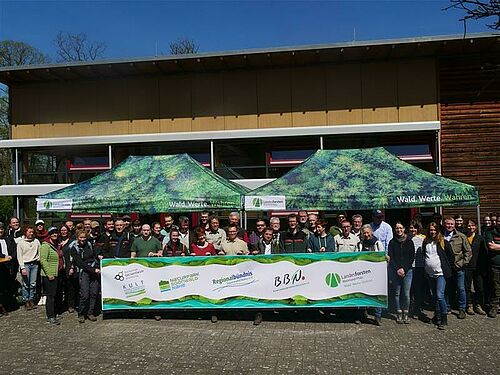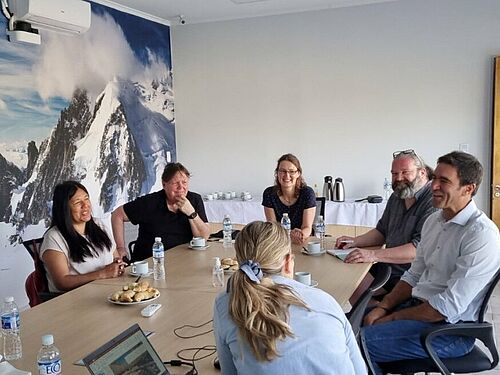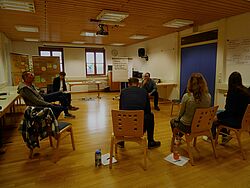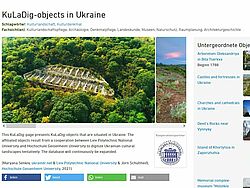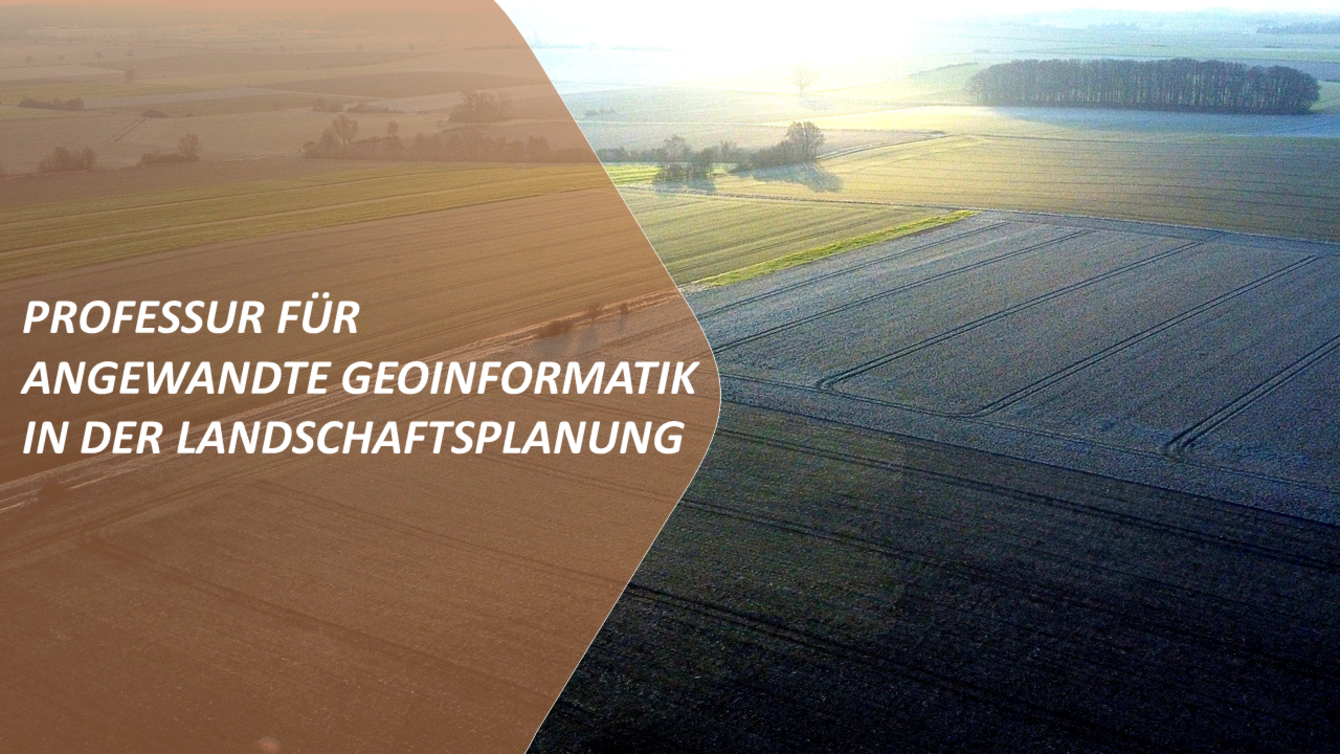I-LN News
Professorship for Landscape Development
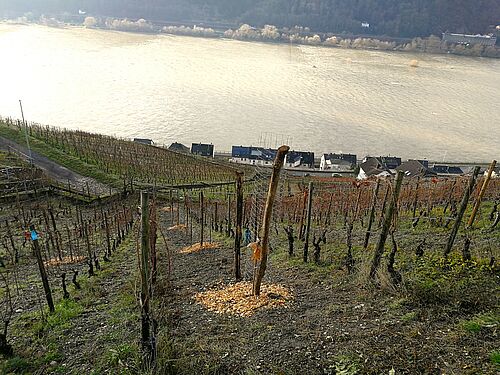
In the WELMO project, particular attention is paid to the increasing abandonment of land use - especially vineyards - and scrub encroachment in the Upper Middle Rhine Valley cultural landscape.
The WELMO project focuses in particular on the increasing abandonment of land use - especially vineyards - and bush encroachment in the cultural landscape of the Upper Middle Rhine Valley. The young and committed winegrowers from the KMH Weine winery in Kaub are bringing a breath of fresh air to the Middle Rhine Valley and have recently planted a Vitiforst in the project municipality of Lorch. This is an agroforestry system in the vineyard, i.e. shrubs and trees are planted between the rows of vines. This not only promotes structural and species diversity in the landscape, but can also create benefits, particularly with regard to the effects of climate change, e.g. through shading and soil improvement, as well as promoting valuable synergies between the crops. Among other things, shrubs, herbs and berries were planted in Lorch/Lorchhausen, which will later be used for distilling and thus expand the winery's product range. Species/varieties were selected that cope well with the warm, dry conditions on the slopes of the Rhine and are also suitable for the site in terms of future climatic changes. They were planted as rows in every second (wider) aisle of the vineyard, which is planted with old Riesling and Silvaner vines.
On Wednesday 31.05 the participants of the 2nd Science Walk of Geisenheim University could experience a total of nine bird species in the Eduard von Lade Park.
In the later morning hours, the birds in the park were not overly active, so that the participants could concentrate on a few species. The (small) highlight of the tour was the singing summer goldcrest (Regulus ignicapilla). The summer goldcrest is very lively, has colorful plumage, is eager to sing, and is a common breeding bird in our gardens: yet it is often overlooked. This is partly due to the fact that it prefers to stay in the crown area, but also due to the nature of its song. The very high frequencies are difficult or impossible to hear for some people. Easier to hear and see, on the other hand, are Ring-necked and Eurasian Collared Doves. These could be easily recognized by their typical calls during the guided tour. We also found Common Chiffchaff, Eurasian Jackdaw, Buzzard, Swift and Treecreeper.
Currently, 37 bird species and 529 species in total have already been detected in the university areas as part of the ICA Biodiversity Challenge (https://observation.org/bioblitz/hochschule-geisenheim-university/#sg-1). The next Science Walks will be held on June 14, 2023, 10:30 a.m. to 12:00 p.m. (Discover Insect Diversity on University Grounds), June 17, 2023, 4:15 p.m. (Cross-terracing in Steep Vineyards), and June 22, 2023, 1:15 p.m. to 2:15 p.m. (Plant Diversity in (University) Park).
As a member of the “Association for European Life Science Universities” (ICA) Hochschule Geisenheim University will be joining the ICA Biodiversity Challenge/BioBlitz 2023 from May 22 to June 30, 2023. The challenge, which is open to students, staff and visitors, is designed to raise awareness of biodiversity on campus and provide an opportunity to learn more about the species found on the university grounds.
What is the ICA Biodiversity Challenge (ICA BioBlitz 2023)
The aim of a “BioBlitz” is to record as many living species (animals, plants, fungi) as possible within a designated area and timeframe. The ICA Biodiversity Challenge is one of these “BioBlitz” initiatives designed to count the number of species found on campus. Everyone is invited to join and add species into the Obsidentif, iObs or Obsmapp apps; beginning May 22, all observations made on University ground will automatically count for the challenge. The number of species registered in the apps can be tracked in real-time. In addition, it is also possible to keep track of the progress of other participating institutions.
Click here to find out how you can get involved and join the challenge. For example, we will be organizing "science walks" to bring participants and experts together to identify species.
Under the title "LandschaftAussichten Bacharach" (Landscape Prospects Bacharach), the WELMO project held a participation of citizens in the form of a workshop for the joint development of future landscape perspectives for the municipality in the district of Henschhausen on 5 April 2023. All residents of the municipality (core town on the Rhine as well as the districts of Steeg, Medenscheid, Neurath and Henschhausen) were invited to participate in order to obtain as broad a picture as possible and to consider the municipality in its landscape diversity.
After a short introduction and presentation of the WELMO project as well as a brief overview of the current state of BUGA planning by Dr. Sandra Linz, the approx. 25 participants were divided into 3 groups and invited to discuss three different questions at three "topic tables" according to the World Café method. In 20 minutes each, ideas and reflections were exchanged on the questions
What are your favourite places in the landscape and why?
What elements should the future landscape of Bacharach have?
Where do you see problems and challenges in the landscape?
were noted down on writable tablecloths and discussed in the group. After the three group phases, the results were finally summarised and discussed again in the plenary.
The results of the event, in which perspectives and goals for a future Bacharach landscape were developed, are relevant for further work in the project municipalities as well as for the BUGA and lay an essential foundation for further cooperation.
Students of landscape architecture (5-7 semesters) developed an actionbound on a topic of their choice in the field of environmental education in the winter semester 2022/23. The aim was to combine problem-oriented learning in authentic contexts with the use of digital media.
A total of 30 students created 5 thematically and conceptually very different action bounds. All paths can be used free of charge and each starts at a building at Geisenheim University with free W-LAN. This means that both the "Actionbound" app and the content of the educational paths can be downloaded easily.
Overview of the created trails:
- Welcome to the woodland trail
Woody plants nature trail to support the course Woody plants and habitats part 1 and 2 in the first and second semester of the degree course Landscape Architecture B.Eng.
Getting to know the Rhine(-gau) - The "Get to know the Rhine (-gau)" nature trail
provides orientation in Geisenheim at the Schönborn'schen Aue. Topics related to the Rhine are explained, such as the structure of the floodplain, flora and fauna, shipping traffic and flooding. A nature trail by students for students from the first semester, as well as other interested people who have moved here. - Von Lade's footsteps through Geisenheim
In the course of the nature trail, culturally and historically important places in Geisenheim will be explained. What is the background of the buildings and how old are they? To achieve this, the first honorary citizen of Geisenheim, Heinrich Eduard von Lade, is the tour's guide and narrates the circumstances from his point of view. Through texts, pictures and audios, you can experience the path through Geisenheim and see a whole new side of the university town on the Rhine. - Experience nature with Lizard Billy
The nature trail focuses on nature conservation in the vineyards, what is there and what can be improved. The aim is to work with the visible contrast between the different landscapes of forest, city and vineyard. To this end, the tour is intended to sensitise children and consciously draw their attention to nature. - (Hi)Storytime
A theme trail to introduce information about the typical sights of Geisenheim's town centre and to draw attention to lesser-known details that are nevertheless worth seeing.
What is Actionbound?
With the help of the Actionbound app, a digital scavenger hunt can be designed for mobile devices. Users are navigated via the app to various stations where they solve tasks, receive information or are simply made aware of something specific. The waypoints and tasks must be created beforehand within the Actionbound platform via an internet browser. Each Actionbound is therefore a self-designed, self-contained learning unit. In order to design these, the students not only have to familiarise themselves with the
A research cooperation between the Department of Landscape Planning and Nature Conservation, the Department of Fresh Produce Logistics and the Institute of Landscape Planning of the Mendel University in Brno, Czech Republic.
How do natural structures affect the beauty and recreational factor of wine-growing areas? To answer this question, Maximilian Tafel, Kristýna Kohoutková and Anne Kleih collected data for their eye-tracking study on February 13-17, 2023. Within the scope of the study, the eye movements of 32 subjects were tracked while they viewed nine images of wine-growing areas with varying levels of natural structures. The eye-tracking technology allows the researchers to see if the subjects focus their attention on the vineyards or the natural structures. To identify the influence on the individual’s perception of beauty and recreational value, the study was coupled with an online survey asking respondents to rate the beauty and relaxing effect of each landscape. The data is currently being analyzed and we are looking forward to the results.
On 16 February 2023, the project advisory board met for the first time in the project "Landscape Mosaic World Heritage Upper Middle Rhine Valley". The meeting, which lasted about 2 hours, took place at the Geisenheim University of Applied Sciences and facilitated a valuable exchange between those working on the project and external stakeholders from various relevant disciplines. After a short introduction and presentation of the project, various topics and aspects were discussed in a large group. In this way, the project team was able to obtain constructive criticism and useful information on other projects, possible points of contact and interfaces. In particular, the topics of grazing, nature conservation compensation in viticulture, scattered fruit, coppice, agroforestry in viticulture and the association of FFH habitat types stimulated debate. The representatives from various landscape-related associations and societies, the Higher Nature Conservation Authority, the Forestry Department, the Hessian Ministry of the Environment, the Hessian State Office for the Preservation of Monuments, the BUGA gGmbH 2029 and representatives of the two project partners, the RLP Nature and Environment Foundation and the RhineMain Regional Park, showed great interest in the project and presented their views on the topics and problems addressed. All in all, the meeting provided target-oriented insights and valuable impulses for the further work in the project. Another meeting of the project advisory board is planned for the second half of the year.
Networking with other actors and institutions active in the region is also of particular relevance in the Middle Rhine project in order to identify possible interfaces and points of contact and to bring together knowledge and experience. Discussions and meetings on site are important for exchanging ideas and gaining insights into different fields of activity and points of view.
Meeting with graziers
In November 2022, a meeting took place with the grazing initiative MittelrheinZiege of Mr. and Mrs. Maurer in Oberdiebach (near the project municipality of Bacharach), who practice landscape management by means of goat grazing. The animals keep former vineyard sites open and prevent the overgrowth and gradual bush encroachment of the areas through natural succession - a widespread phenomenon in the Rhine slopes of the region as a result of abandonment. African Boer goats and Thuringian Forest goats can also be used on steep slopes. In the large-scale, semi-open pasture landscape "Bischofshub", exmoor ponies are also used all year round as landscape managers as part of a project of the GNOR (Society for Nature Conservation and Ornithology Rhineland-Palatinate e.V.). The horses also easily overcome walls and terraced slopes and are suitable for extensive grazing and keeping slopes open. The grazing model offers a successful reference project that could possibly be followed up.
Participation in the dry stone wall building course
Dry stone walls are evidence of the traditional terraced landscape of the Upper Middle Rhine Valley, which was once characterised by viticulture and fruit growing. Today, there are still many of them on the slopes of the Rhine, but they are often in a state of disrepair.
In November, landscape planner Jenny Eckes took part in a dry stone wall building course organised by the Zweckverband Welterbe Oberes Mittelrheintal in cooperation with the Geisenheim University of Applied Sciences and the Rüdesheim Forestry Office. In Rüdesheim's "Krähennest", an old vineyard site below the Niederwald Monument, a historic dry stone wall was rebuilt. During the three-day seminar, Jenny Eckes gained a comprehensive insight into the traditional craft technique of dry stone wall construction and was able to actively contribute to the preservation of the historic cultural landscape. The Zweckverband Welterbe Oberes Mittelrheintal regularly offers courses on dry-stone wall construction for interested people, and several dry-stone walls have already been restored and rebuilt in the project municipality of Spay.
Meeting with NatureFund e.V. Wiesbaden
NatureFund e.V. is particularly active in the development and implementation of sustainable forms of land use and is interested in possible cooperation projects. In November 2022, a meeting took place with the Executive Director in Wiesbaden-Erbenheim on a pilot project on Dynamic Agroforestry (DAF).
Through the multiple use of the soil, land in agroforestry can be used more efficiently and in a more diverse way. At the same time, agroforestry systems bring structural diversity to the landscape. Basically, a distinction is made between silvoarable systems (woody plants and arable crops/grassland), silvopastoral systems (woody plants and livestock) and agrosilvopastoral systems (woody plants, arable crops/grassland and livestock) (DeFAF 2022). Due to the resulting synergies, agroforestry systems are a particularly resilient and sustainable form of land use, which can possibly also be applied in the Upper Middle Rhine Valley project region. However, the special and partly extreme site conditions of the Middle Rhine Valley have to be taken into account and utilisation options have to be carefully weighed up.
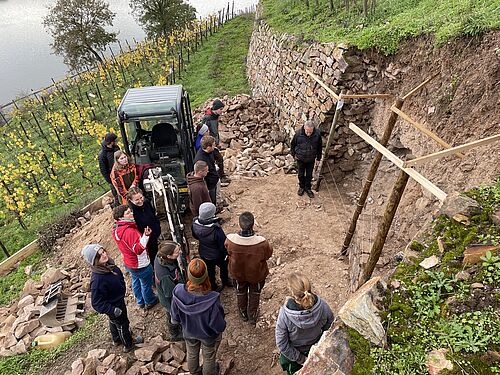
Rüdesheim. In a cooperation between Geisenheim University of Applied Sciences, the Rüdesheim Forestry Office and the Zweckverband Welterbe Oberes Mittelrheintal (Upper Middle Rhine Valley World Heritage Association), a historic dry stone wall was built together with students in the so-called "Krähennest" (Crow's Nest), an old vineyard terrace site below the Niederwald Monument in Rüdesheim.
Ten students from the Landscape Architecture, Viticulture and Oenology courses at Geisenheim University of Applied Sciences learned the technique of building dry stone walls and reconstructed an old dry stone wall in Rüdesheim from 4 to 6 November 2022 in an old vineyard site, the so-called "Krähennest" (Crow's Nest), which belongs to the university as a teaching vineyard. The focus was on preserving the cultural landscape, teaching and raising awareness of the old craft technique of dry stone wall construction, as well as contributing to nature conservation. The Krähennest is one of the last old terraced sites in the Rüdesheim vineyards and thus a testimony to the old, traditional cultural landscape of the Middle Rhine Valley.
Geisenheim University of Applied Sciences, located at the gates of the World Heritage Site, is an important partner for the Zweckverband Welterbe Oberes Mittelrheintal. A professional exchange is already taking place in various projects to enable a transfer from theory and research to practice. In concrete terms, an old vineyard wall has now been rebuilt by the students and under the supervision of winemaker Helge Ehrmann from Obernhof an der Lahn as part of a three-day seminar programme. "The UNESCO World Heritage Site is not only an important seal for tourism, but also obliges us to preserve and develop the unique cultural landscape. At the same time, World Heritage sites are also places of education for younger generations. We are combining these two aspects with this project," said Hansjörg Bathke (Rheingau-Taunus district), head of the World Heritage department, who saw the work for himself on site. Bathke expressed his special thanks to the Rüdesheim Forestry Office, which provided funds from the State of Hesse for nature conservation measures in the World Heritage Site for the project and thus made the implementation possible in the first place.
With great enthusiasm, several tonnes of stones were moved by the students and a collapsed gap in a larger dry stone wall was closed again. The course awakened enthusiasm for the preservation of the old walls among the budding winegrowers and landscape architects. A regular course is therefore planned for the following years and is intended to strengthen the cooperation between the partners as a building block in the long term.
New opportunities for the development of the steep slope landscape in the UNESCO World Heritage Site Upper Middle Rhine Valley:
Press release of the Upper Middle Rhine Valley World Heritage Site Association
Dolkstrasse 19, 56346 St. Goarshausen, Germany
Tel.: 06771-40 399 - 30, Fax: 06771-40 399 - 49
Email: info@zv-welterbe.de
Categories: Competence Centre Cultural Landscape, Landscape Planning
Professorship for Landscape Planning and Impact Management
Time: Tuesday, 18.04.2023, 18-19:30, lecture, followed by a drink.
Place: Geisenheim University, Villa Monrepos, Rüdesheimer Str. 5, HS 12 (1st floor)
Dear students, dear colleagues, dear winegrowers, dear interested parties,
We hereby cordially invite you to the presentation of the results of the Master's project Landscape Planning (winter semester 2022/23). We look forward to talking with you over a glass of wine after the presentation! Registration is not required.
Time: Tuesday, 18.04.2023, 18-19:30, lecture, followed by drinks.
Place: Geisenheim University of Applied Sciences, Villa Monrepos, Rüdesheimer Str. 5, HS 12 (1st floor).
About the project: Especially on steep slopes, historical viticultural use has been and is being increasingly abandoned. The associated scrub encroachment not only affects the typical image of the cultural landscape in the Rheingau and Middle Rhine Valley, but also means a loss of valuable habitats for open land species. As part of the project, a team of students has been looking for solutions that combine (viticultural) use and protection. A step-by-step guide and proposals for measures for model areas were developed to show how replanting can succeed while taking into account nature conservation criteria (e.g. by creating cross terraces with species-rich slopes or introducing structural elements).
Compensation areas in transport infrastructure projects in the light of climate and landscape change - A research project of the D-A-CH countries (Germany, Austria, Switzerland).
The new project at the Institute for Landscape Planning and Nature Conservation started at the end of 2022. How can the impacts on nature and landscape caused by transport infrastructure projects be compensated in a more sustainable and binding way in the long term? In the transnational project, the implementation practice of compensation areas as well as the existing compensation area registers and eco-account regulations are analysed and presented. In addition, the current national legal framework conditions will be presented. In addition to recording the status quo, recommendations for the sustainable development of compensation areas in transport infrastructure projects are to be developed by linking ecology, planning and law. A special focus is placed on the future challenges of climate and landscape change.
A guideline is being developed that offers long-term planning and legal certainty for motorway and motorway projects and also helps to reduce impairments to the performance and functionality of the natural balance and the landscape in the long term.
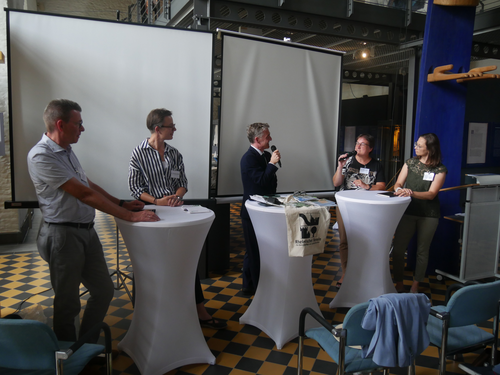
The transformation of the cultural landscape - as it is taking place due to the effects of climate change, among other things - requires a great deal of communication and negotiation of solutions by different stakeholders. Coping with the changes can only be meaningful and effective together, in a multidisciplinary solution process. This is why the Cultural Landscape Competence Center at Hochschule Geisenheim University Geisenheim, together with the Rheinischer Verein and in cooperation with the Rhineland-Palatinate Directorate-General for Cultural Heritage and the Upper Middle Rhine Valley World Heritage Association, has invited people to kick off such a discussion process.
The Upper Middle Rhine Valley can look back on over 2000 years of human use and is today one of the most famous German landscapes with a unique cultural heritage. The cultural landscape, characterized by castles, palaces and steep-slope viticulture, is facing considerable challenges: These include, above all, the decline in viticulture and fruit growing and the structural preservation of monuments. The effects of climate change in the region are also becoming increasingly noticeable: Heavy rainfall with floods on the one hand and hot and dry periods and resulting droughts on the other are becoming constantly recurring events.
What can an integrative overall concept for climate adaptation for the Middle Rhine Valley look like that also comprehensively takes into account the interests of monument conservation?
Landscape change through imported architectural styles: Geisenheim is preparing a new research collaboration with partner universities in Ukraine and Romania. On June 9, 2023, a first joint Ukrainian-Romanian-German workshop on the development of cultural landscapes for future research cooperation took place in Suceava (Romania).
The meeting was organized by the Cultural Landscape Competence Centre at Hochschule Geisenheim University, represented by Dr. Martin Reiss and Dr. Jörn Schultheiß. It was hosted by the Vice Director Prof. Dr. Stefan Purici, Stefan cel Mare University of Suceava. Scientists from four universities took part:
Ukraine:
National Polytechnic University of Lviv
National Yuri Fedkovych University of Chernivtsi
Romania:
Stefan cel Mare University of Suceava
Germany:
Hochschule Geisenheim University
The aim of the workshop was to deepen the existing cooperation with the Ukrainian universities and to establish new cooperation in teaching and research. The focus was on developing a vision and an outline topic for a joint research project. The scientists presented their current projects in joint fields of activity. In addition to similarities in terms of specialist content on topics relating to the development of cultural landscapes and the preservation of cultural heritage, the main points of contact were the transfer of knowledge, the presentation of cultural landscapes for the public and the preservation of cultural heritage.
Forests are drying out due to the lack of water, and spruce is almost completely disappearing from many forests within a few years. For science and practice, one thing is clear: In the future, the landscape must store precipitation water like a sponge so that forests have a chance of being preserved over large areas. And this cannot be the sole task of forestry, but requires an integrative overall concept: agriculture, nature conservation and local authorities must also work together on this. This became clear at a conference in the Soonwald Forest Experience Center.
The Competence Center Cultural Landscape (KULT) of the Geisenheim University of Applied Sciences, together with the Soonwald-Nahe Nature Park, the Regional Alliance Soonwald-Nahe, the Federal Association for Professional Nature Conservation and Landesforsten Rhineland-Palatinate, had invited participants to a workshop on the topic of water retention in the landscape. This was part of a series of events presented by KULT for the fourth time, which since this year has been called viSiOONWALD.
The workshop attracted over 100 participants from all over Germany, including representatives from politics, science, authorities, municipalities, planning offices and interested citizens. A total of eight working groups addressed obstacles to ensuring and improving natural water retention, strategies for achieving natural water retention, and the measurability of the success of measures taken.
Natural water retention measures are considered nature-based solutions by using natural processes and ecosystem properties to address societal challenges such as climate change. Often, they are not new at all, but are implemented by hydrology and water management, in nature conservation and by forestry. What is new, as became clear at the workshop, is the merging of these sectoral approaches into an integrative overall concept. The conference showed that this represents a paradigm shift: . To achieve this, different actors must network better and bring together their approaches to near-natural water retention across disciplines. The workshop was an important prelude to this. Water retention, it was pointed out, is an essential building block for the decentralized management of flood risks, to cope with periods of drought and to replenish groundwater levels. Easily measurable criteria need to be established to verify and further develop the effectiveness of the measures.
This was followed by an excursion to the Soonwald forest, which vividly deepened the topics addressed. On site, various projects and measures to promote water retention were visited and discussed with experts.
The findings will now be evaluated and will probably be published as a position paper at the end of May. In the coming years, viSiOONWALD is to be established as an annual expert forum at the Soonwald Forest Experience Center.
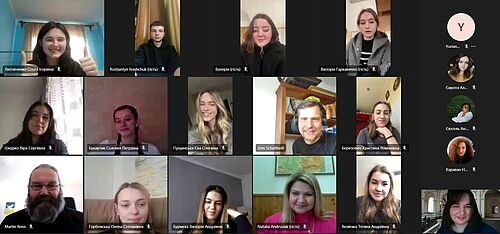
Monday, 3.4.2023 at 10:30 a.m. was the start of the online course "Digital cultural landscapes - new opportunities for Ukraine 2023". Despite the armed assault by Russian troops, Dr Maryana Senkiv from the National Polytechnic University of Lviv/Ukraine, together with Dr Jörn Schultheiß and Dr Martin Reiss from the Competence Centre Cultural Landscapes at HGU, is offering the course for the third year in a row.
For the first time, students from the National Yuri Fedkovych University in Chernivtsi and their lecturer Dr Natalia Andrusiak will be taking part.
During the event, students from the two Ukrainian universities will learn how to use the information system "KuLaDig" (Cultural Landscape Digital). They will also be shown the development of cultural landscapes in Europe and Germany. The students then work independently on articles about cultural landscapes and the cultural heritage of Ukraine. The results are integrated into the KuLaDig system.
The event is a living expression of the cooperation and partnerships between Geisenheim University and the two Ukrainian universities in Lviv and Chernivtsi.
The results of the courses from 2021 and 2022: www.kuladig.de/Objektansicht/SWB-334742
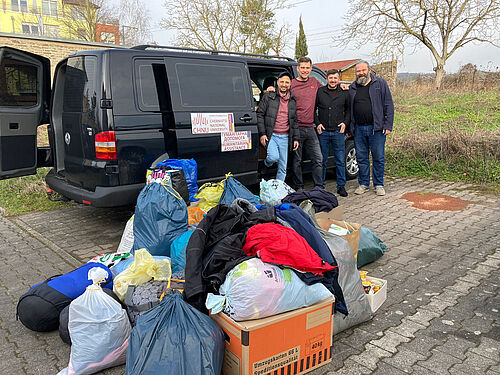
Geisenheim University has launched an appeal for donations for the Bukovina Aid of the National Yuri Fedkovych University in Chernivtsi. The donations in kind will go to Ukrainian internally displaced persons in Bukovina, to war-affected persons throughout Ukraine and to civilian persons who are along the front in eastern and south-eastern Ukraine.
The National Yuriy Fedkovych University of Chernivtsi (Ukraine) and Geisenheim University have been cooperating since January 2022 to exchange knowledge in research and teaching. In mid-March, Serhij Lukanjuk (Head of the International Office) and Dr. Taras Hrynivskyj (Institute of Journalism) from Czernowitz visited our university to get to know the location and the staff. The Ukrainian colleagues were able to travel to Geisenheim in a minibus as part of the Erasmus+ staff mobility for teaching & training funding programme.
Foot and hand warmers, sleeping bags, thermal underwear (underwear, fleece jackets, gloves, hats, tube scarves etc.), batteries, torches and food donations were collected.
Our heartfelt thanks go to all those who donated. Monetary donations can still be made at www.ikgs.de/bukowinahilfe_.
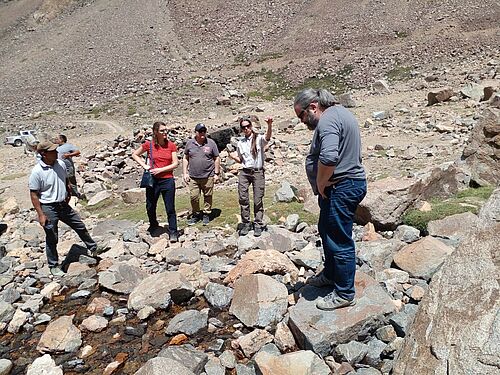
On 26 April from 7 pm, all those interested in the project "Municipal Climate Partnership with Tunuyán" will have the opportunity to learn first-hand about the results of the first visit.
Over empanadas and red wine, the three delegation members Stefan Seyffardt and Julia Übelhör from the City of Eltville, together with Dr. Martin Reiss from the Geisenheim University of Applied Sciences, will report in the Electoral Castle in Eltville on their experiences during their approximately one-week visit to Tunuyán in February.
On site, the delegation from the Rheingau was able to gather numerous different impressions and take away some interesting insights as part of an ambitious and rich programme of visits. For in the wine and tourism region in Mendoza, there are - despite different framework conditions - many similar challenges as in the Rheingau. Especially with regard to the topics of climate protection and adaptation to the consequences of climate change, concrete measures are being planned.
At the information evening on 26 April, the delegation members will show pictures from their visit to Argentina and there will be room for an open exchange about the partnership. As the number of places is limited, online registration at www.eltville.de/anmeldung-infoabend-klimapartnerschaft/ is requested.
More information on the municipal climate partnerships programme can be found at: www.eltville.de/leben-wohnen/nachhaltiges-eltville/klimaschutz-anpassungen/kommunale-klimapartnerschaft/ or skew.engagement-global.de/kommunale-klimapartnerschaften.html.
PM: City of Eltville
A delegation from Eltville am Rhein visited the Argentinian twin town of Tunuyán in the wine-growing region of Mendoza for the first time from 9 to 18 February 2023. The town twinning between the town of Eltville am Rhein and the Argentinian municipality of Tunuyán in Mendoza has existed since December 2021. As part of the cooperation agreement between Eltville and Geisenheim University, Dr Martin Reiss from the Competence Centre Cultural Landscape travelled with the delegation to provide technical support and advice. Tunuyán is located in the centre of the "Valle de Uco" region.
On site, Julia Übelhör (Sustainability Management Unit) and Stefan Seyffardt (Technical Manager of the Works Yard and Head of the Civil Engineering and Parks Department) from the town of Eltville am Rhein and Dr. Martin Reiss (Competence Centre Cultural Landscape) from Geisenheim University learned a lot about the current situation and the activities of the partner municipality. "Numerous meetings and exchange rounds allowed a deep insight into very different topics," the three report, "and with temperatures partly above 40 degrees, we were able to get a direct picture of the summer heat wave and the consequences of global warming ourselves."
Less snow and melting glaciers in the Andes, for example, pose serious challenges for the actors on the ground. While the region is currently proving to be quite green and fertile, with very little rainfall, agriculture is completely dependent on the elaborate irrigation system. The water for irrigation comes almost entirely from the Andes. As this is becoming less and less, Mendoza has been facing a water crisis for the past 10 years.
Although the conditions in both municipalities are very different in many ways, there are some strikingly similar challenges. "For example, long and dry summer months also affect our viticulture at home in the Rheingau," explain Seyffardt, Übelhör and Reiss.
The exchange and the international development of the cooperation is financed within the framework of the "Municipal Climate Partnerships" programme. The programme, implemented by the Service Agency Communities in One World (SKEW) of Engagement Global in cooperation with the State Working Group Agenda 21 NRW (LAG 21 NRW), strengthens the exchange between municipal actors in Germany and the global South (https://skew.engagement-global.de/kommunale-klimapartnerschaften.html).
In this context, it was clear to the city of Eltville am Rhein from the very beginning that Geisenheim University (HGU) is an important project partner. There is also a university partnership between HGU and the Universidad Nacional de Cuyo, which is itself working on the topic of climate change in Mendoza. The kick-off workshop of the Municipal Climate Partnerships programme took place in Essen in November 2022. A three-member delegation from Tunuyán visited the Rheingau on this occasion.
As part of the Municipal Climate Partnerships programme, the participants now exchange ideas on ways to conserve the valuable resource of water, and the topics of climate protection, economic development and social measures for more equal opportunities are also on the agenda. Exchange programmes, research cooperation and joint projects for climate protection are also planned. By 2024, the two cities will develop an action plan that includes measures for climate protection and adaptation in Tunuyán and Eltville. The Competence Centre Cultural Landscape is being asked to provide scientific support.
PM: Julia Überhör, Martin Reiss
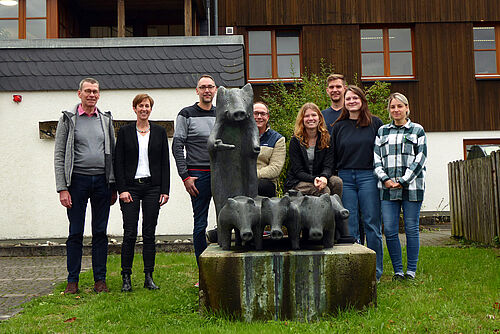
Since 2017, we have been working in the Competence Centre Cultural Landscape (KULT) together with our partners from funding institutions, science and practice on concepts and solutions for sustainable cultural landscape development. In order to successfully expand the work of the Competence Centre in the coming years, the KULT team of Geisenheim University of Applied Sciences started the development of a concrete strategy during a workshop at the Forestry Training Centre in Hachenburg on 28 and 29 September 2022. This is to result in a framework for action with concrete goals and measures in which all partners can work together on the most pressing issues of sustainable development of cultural landscapes in a goal- and practice-oriented manner.
Further workshops will follow to discuss the various aspects of the strategy with the KULT network and to gather feedback and ideas from the stakeholders. We will then consolidate the results into a strategy document. These steps will help to align the development of the Competence Centre Cultural Landscape and the work of all stakeholders towards a common mission statement.
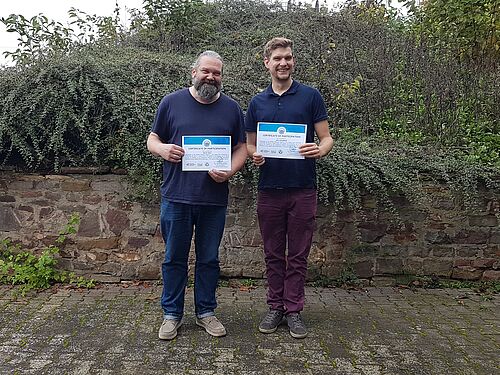
Countless cultural assets were damaged or destroyed during the war in Ukraine. Before the war, there were about 400 museums, 3000 cultural sites and seven World Heritage Sites1 in Ukraine. These included, for example, the historical centre of Lviv not far from the Polytechnic University. UNESCO confirmed (by 24 October) damage to 207 cultural sites in Ukraine (88 religious sites, 15 museums, 76 buildings of historical and/or artistic interest, 18 monuments, 10 libraries)2. The war is endangering the cultural heritage and thus the cultural identity of the country.
For two years now, the National Polytechnic University of Ukraine in Lviv (Lemberg) has been cooperating with Geisenheim University. Together with the Viacheslav Chornovil Institute for Sustainable Development, the Competence Centre Cultural Landscape (KULT) of Geisenheim University works on topics of landscape development in Ukraine. As part of this cooperation, the Geisenheim scientists Dr Martin Reiss and Dr Jörn Schultheiß took part in the "Visiting Professor Programme" in Lviv and have now been awarded a certificate. Together with their Ukrainian colleague, Dr Maryana Senkiv, they offer a course on the digitisation of features of Ukrainian cultural landscapes and thus contribute to the preservation of Ukraine's cultural heritage. When reconstruction begins, such documentation can serve, for example, the proper reconstruction of culturally and historically valuable assets. This fits thematically into activities of KULT, which organises a nationwide working group for the system KuLaDig (Kulturlandschaft Digital) and is involved in several projects for the digitisation of cultural landscapes in Germany.
Link to content created in the teaching event: https://www.kuladig.de/Objektansicht/SWB-334742
Participation in the Visiting Professor Programme is a step towards internationalising Geisenheim's teaching in landscape architecture and landscape planning. In the future, joint courses with Ukrainian and German students are planned, as well as the integration of Dr. Maryana Senkiv into teaching at Geisenheim.
____________________________________
1. www.srf.ch/kultur/gesellschaft-religion/ukraine-zerstoerte-kulturgueter-kunsthistoriker-das-loescht-die-kulturelle-identitaet-aus
2. www.unesco.org/en/articles/damaged-cultural-sites-ukraine-verified-unesco
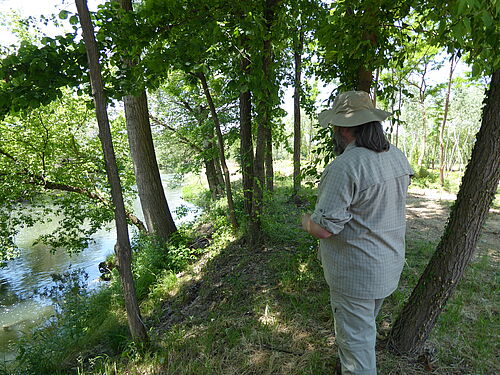
Water is increasingly becoming a precious commodity in climate change. With Dr Martin Reiss, the Competence Centre Cultural Landscape (KULT) at Geisenheim University of Applied Sciences will in future play a key role in national and international standards for the implementation of the EU Water Framework Directive and the protection and regeneration of the landscape water balance:
Water is increasingly becoming a precious commodity in climate change. With Dr. Martin Reiss, the Competence Centre Cultural Landscape (KULT) at Geisenheim University of Applied Sciences will in future play a key role in national and international standards for the implementation of the EU Water Framework Directive and the protection and regeneration of the landscape water balance: As chairman, he has headed the GB-10 "Water Framework Directive" expert committee of the German Association for Water, Wastewater and Waste (DWA) since November 2022. With this appointment, he also participates as a member in the DWA main committee "Water and Soil".
In Europe, the DWA is the association with the largest membership in the fields of water management, wastewater, waste and soil protection. It plays a special role through its technical competence in rule-making, education and information of the public. The approximately 14,000 members represent experts and managers from municipalities, universities, engineering offices, authorities and companies. The water industry is an important and central player in the cultural landscape. From KULT's point of view, close integration into the actor network on the cultural landscape is therefore an important step for the transfer of knowledge.
The focus of the work of the DWA technical committees is on the development and updating of the DWA rules and regulations, as well as collaboration in the development of technical standards at national and international level. As chairman of the GB-10 "Water Framework Directive" expert committee, Martin Reiss will in future chair the renowned Erfurt Talks on the Water Framework Directive. The implementation of the Water Framework Directive is a permanent challenge for water management: by 2027 at the latest, ground and surface waters in the EU must have at least a good ecological status - they are still miles away from this goal. Every year, the Erfurt Talks shed light on both organisational and ecological aspects of this. The field of tension between environmentally relevant requirements and the culturally shaped landscape always provides sufficient occasions for discussion.

